
The Cabbage Key Inn was built as a private home in 1937. It was converted into an inn in the 1940s and has been owned by the Wells family since 1976. (Photo by Bonnie Gross)
Cabbage Key, a little island west of Fort Myers reachable only by boat, is famous for a lot of things — its historic Dollar Bill Bar, papered with more than $70,000 in signed dollar bills from patrons; its association with Jimmy Buffett. Cabbage Key is familiar to thousands who visit on a popular luncheon cruise from Pine Island or Captiva and spend perhaps two hours.
But visiting Cabbage Key for a longer period of time, in the quiet mornings before day visitors arrive and in the golden evenings when the iconic bar has only a handful of boaters and fishermen, reveals a different side of Cabbage Key.
We spent two nights in a charming small room at the inn and kayaked the quiet waters between Cabbage Key and Cayo Costa Island. Cabbage Key makes an excellent base for kayaking.
I fell in love with this island, its history, its ambiance and, I have to admit, its tortoises.
It’s more than a luncheon destination for tourists; when you spend a bit more time, it’s a visit to a Florida we’ve almost lost.
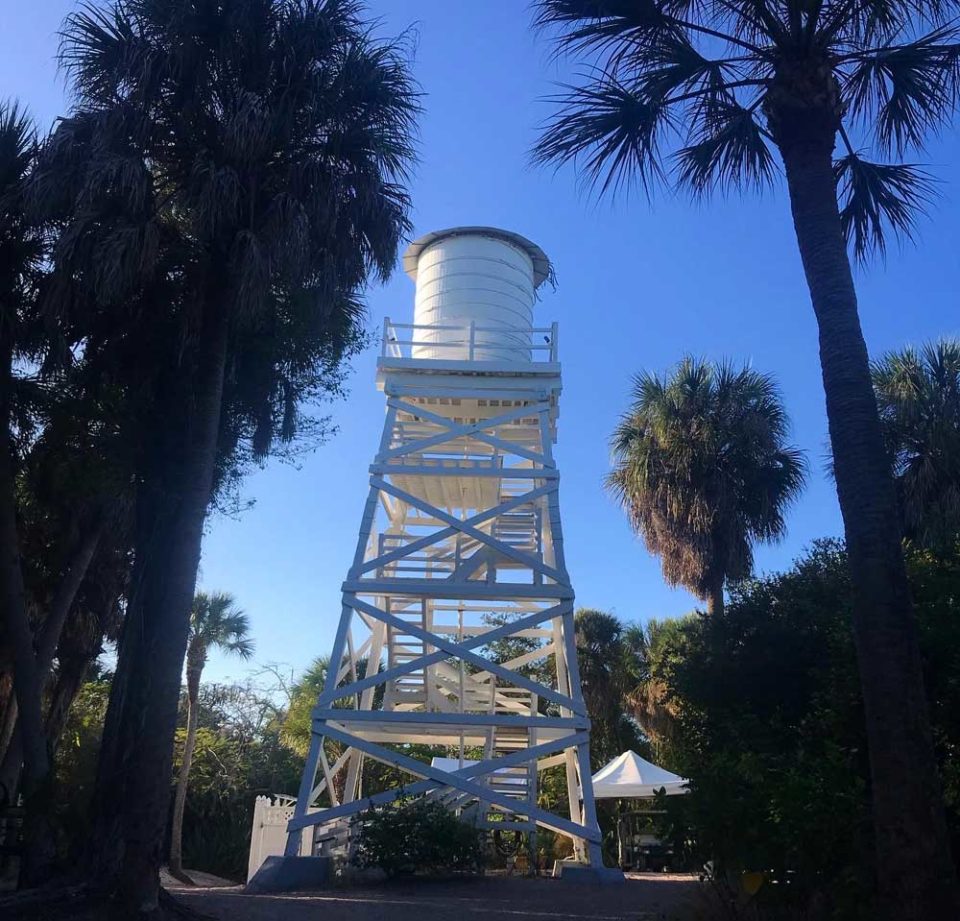
The historic wooden water tower on Cabbage Key still holds the water pumped from a well, the island’s only source of water. (Photo by Bonnie Gross)
Why visiting Cabbage Key fascinated me
Cabbage Key’s origin story has always revolved around a famous mystery writer of the early 20th century, Mary Roberts Rinehart. “The American Agatha Christie” is an amazing character, but her role at the island has been overstated, according to Mark Young, a manager at the inn who is researching its history.
Cabbage Key owes most of its character to another fascinating woman, the driving force behind building the house on Cabbage Key in 1937 that became the inn — Gratia Houghton, who married Rinehart‘s son and died at age 34.
A wealthy debutante, one of her great contributions was allowing a scientist from the National Museum of Natural History to live and work on the island while studying tarpon, which attract fisherman from around the country. (The scientist later became the director of Mote Marine Laboratory in Sarasota.)
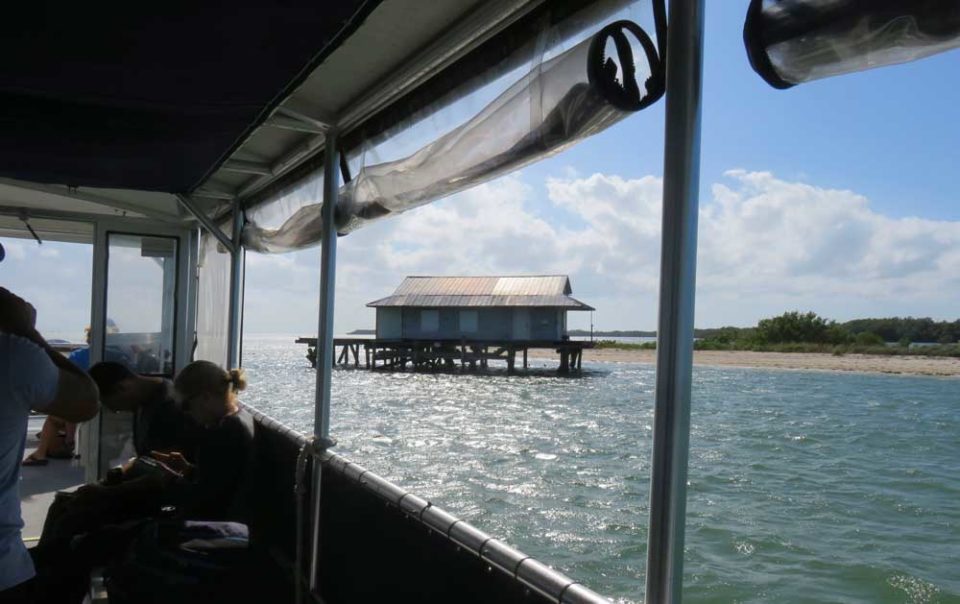
Fish shack off North Captiva Island, part of the scenic boat ride when visiting Cabbage Key. (Photo by Bonnie Gross)
Gratia Houghton Rinehart designed the home that became the Cabbage Key Inn and built one of the most popular rental cabins, the Doll House, as a playhouse for her children. Her famous family included cousin Katherine Hepburn, who is said to have visited the island.
There were other fascinating owners of Cabbage Key, but the current family, which has owned Cabbage Key since 1976, deserves most of the credit for preserving the island and the inn over so many years.
The Wells family is now in its second generation on the island. Sons Ken and Robert grew up there, taking a Boston Whaler to school. “Taking a boat out for us was like going for a bike ride,” Robert Wells said. “We’d take our boat over to North Captiva to visit our friends.”
The brothers now operate both the Cabbage Key Inn and its sister inn five miles east across Pine Island Sound, the Tarpon Lodge on Pine Island. Their parents, Robert and Phyllis Wells, still live on the island and the family owns 97% of its land.

Sunset at the dock at Cabbage Key. (Photo by Bonnie Gross)
Finding Old Florida
Today the 100-acre island has many features that bear the stamp of authentic Old Florida.
There’s a picturesque water tower that has survived many a hurricane. It continues to store the island’s well water today and also serves as a location for an active osprey nest. You can climb the tower for a good view of the area.
Thanks to its elevation – built on a Calusa Indian shell mound 20 feet above sea level — the inn’s dining room and porch have a spectacular view of Pine Island Sound, with a never-ending parade of boats and the backdrop of exclusive Useppa Island about a half mile away.
There is no traffic on Cabbage Key because there are no cars. All goods and services arrive by boat, with the exception of the occasional seaplane.
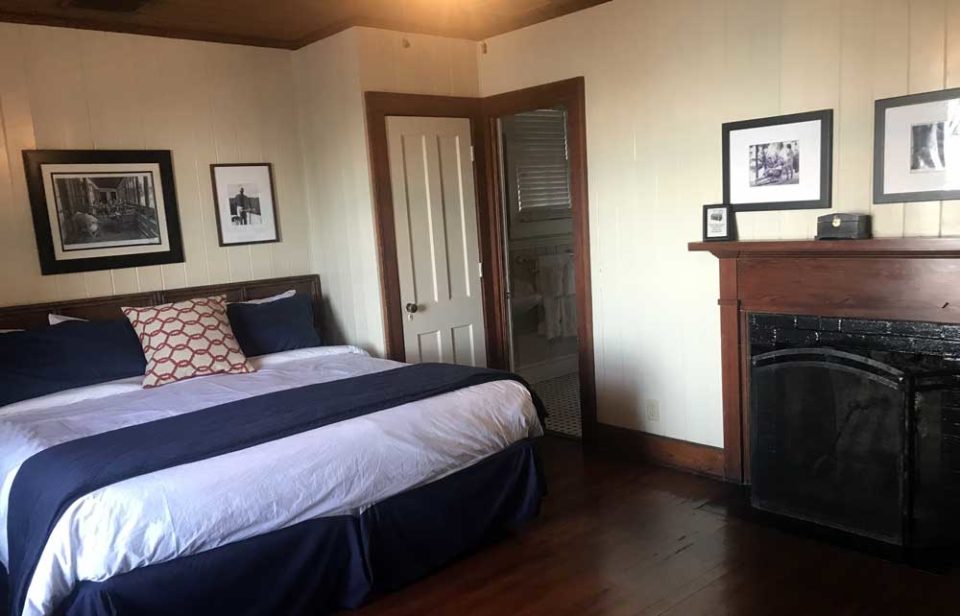
One of the six rooms in the Cabbage Key Inn. (Photo by Bonnie Gross)
Staying at Cabbage Key Inn and cottages
The original house was transformed into an inn with six rooms with private bathrooms and air conditioning. The rooms retain the charm of the original building, some with fireplaces and private screened porches. All rooms are reached via the dining room of the inn, as there is no lobby or other public space. (As a result, lunchtime is not the time to take a nap as the restaurant is bustling with day trippers.)

One of the rental cottages on Cabbage Key. (Photo by Bonnie Gross)
There are also seven cottages on the ground, some with their own private docks, some with multiple rooms and full kitchens.
Rates are seasonal, with high season being Feb. 14 to July 15. The lowest off-season rate is $99 for an inn room. The cottages rent for from $185 for smallest off-season to $550 for the largest on holidays. There is a two-night minimum.
We took advantage of the “off-season” weekday special rate and stayed in Room 5 for $99 a night. We loved the fact that the room had a private screened porch with a waterfront view. While the room was a bargain, other expenses do add up. Transportation to and from the island is via Island Girl shuttle at $48 per person round trip plus parking. (Our total came to $123.) Dining at the Cabbage Key Inn is expensive – breakfasts totaled $30 for two; dinners were $75 plus the essential beverage at the Dollar Bill Bar.
Overall, we thought it was a good value: All the food we had at the inn was excellent, and the ambiance cannot be topped.

From Cabbage Key, a great kayak destination is Cayo Costa, which you reach by paddling through a mangrove tunnel at Murdock Bayou. (Photo: David Blasco)
Kayaking in Pine Island Sound
One reason we decided to visit Cabbage Key was the opportunity to kayak in these waters. Cabbage Key is five miles from Pine Island, a longer kayak trip than I would undertake over open water.
And yet these waters are delightful, so starting from Cabbage Key gave us an opportunity to easily explore by kayak one of the most beautiful sheltered saltwater in Florida.
We rented one of two double kayaks available at the inn for $50 a day and headed to nearby Cayo Costa Island, a largely undeveloped barrier island with a spectacular beach. Half the island is preserved as a state park and the other half has a handful of homes, off the grid, accessible only by boat.

Hundreds of cormorants floated in a tight group on Pine Island Sound during our kayak outing. (Photo by Bonnie Gross)
Our kayaking route was around Cabbage Key, then west into Murdock Bayou. The water was clear and full of wildlife. We saw pelicans, a whole raft of probably 100 cormorants and so many osprey we lost count. One highlight was having dolphins swim near our kayak, popping up repeatedly.
At the northern end of Murdock Bayou there is a narrow mangrove tunnel nicknamed the Tunnel of Love. We joked that maneuvering through the narrow, shallow passageway in a double kayak is such a challenge that if you’re still speaking to your partner, you must be in love.
The Tunnel of Love opens up into a beautiful lagoon, where there is a clearing to pull over your kayak and then a short path across the dunes to the spectacular pristine beaches of Cayo Costa.
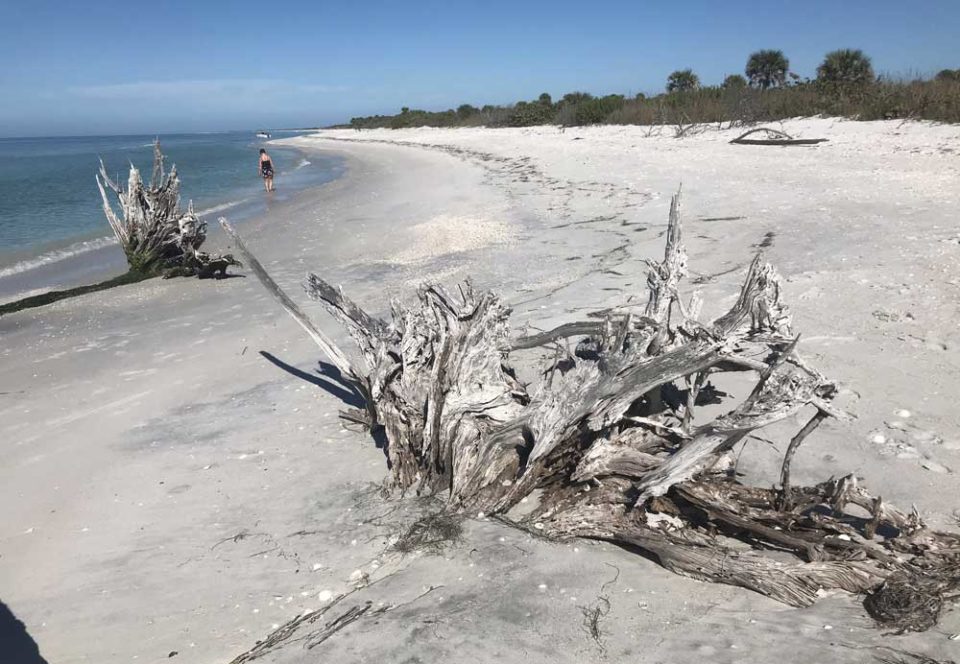
The beach on Cayo Costa is stunning, with white sand, bleached driftwood, shells and few people. (Photo by Bonnie Gross)
The paddle to Cayo Costa is less than an hour, and we spent most of the day beachcombing, swimming and picnicking on a natural beach that goes on for miles and miles. We collected scads of shells and saw not one piece of litter. There are no houses along this beach and the only people there arrived by kayak or private boat.
Kayakers looking for a longer or alternative trip can paddle north to the entrance to Cayo Costa State Park, which is about a 90 minute paddle north.
While Cabbage Key is directly across from Useppa Island, that Island does not allow visitors and Cabbage Key Inn does not allow kayaks to go there.
You can bring your own kayak to the island via Island Girl Charters. They charge $25 and ask that you reserve space for your kayak when you are making the reservation.
Cabbage Key Inn also rents two skiffs at an inexpensive rate — $80 a day. A skiff would be an excellent way to explore the islands on this western end of Pine Island Sound.
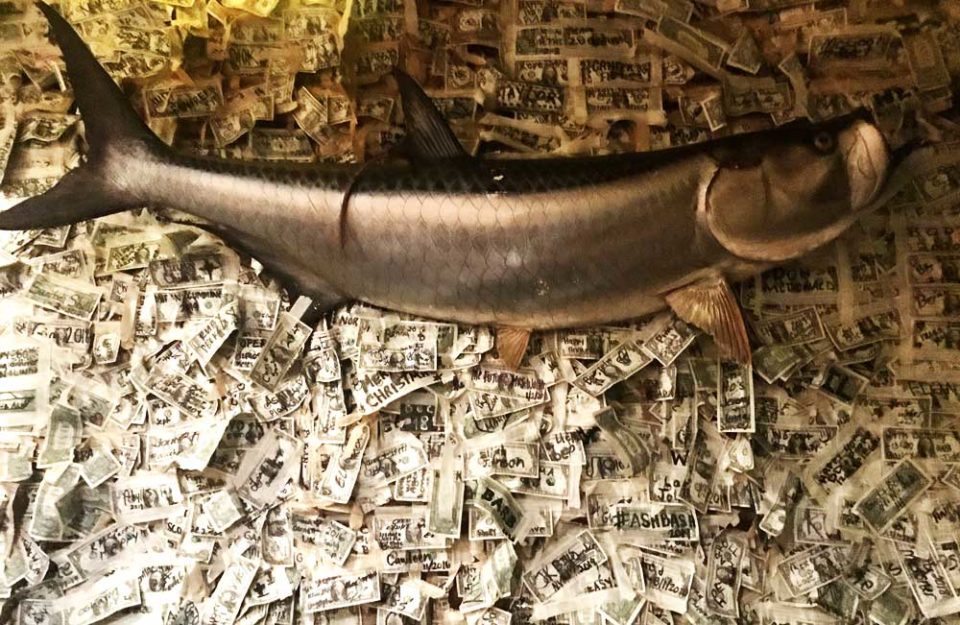
The Dollar Bill Bar at the Cabbage Key Inn is estimated to have more than $70,000 taped to its walls and ceiling. (Photo by Bonnie Gross)
Jimmy Buffett, ‘Cheeseburger in Paradise’ and Dollar Bill Bar
You can’t write a story about visiting Cabbage Key without addressing its connection to Jimmy Buffett.
Did he write “Cheeseburger in Paradise” about Cabbage Key, as is often repeated? The staff at the inn say no, but their explanation is that he DID dedicate the song in at least one local concert to the folks from the Cabbage Key Inn, who were in attendance.
But celebrities from Jimmy Buffett to Jimmy Carter have visited the island.
Jimmy Buffett frequented the Cabbage Key Inn when he visited Pine Island Sound in his famous seaplane. There is even a signed dollar bill from him over the bar.
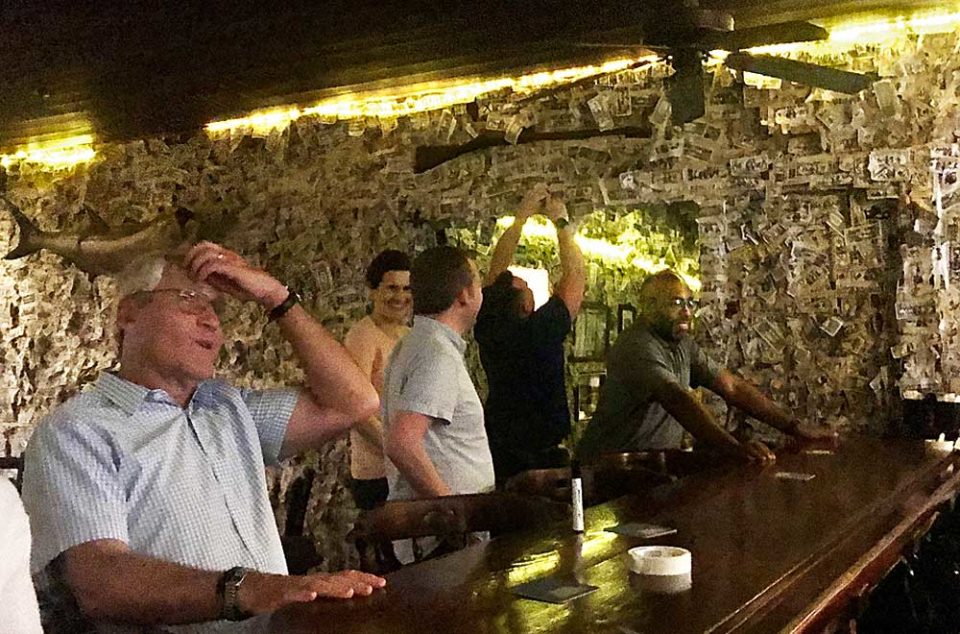
Patron tapes a signed dollar bill to the wall at the Dollar Bill Bar. (Photo by Bonnie Gross)
There’s a dollar bill from President Carter, too, as well as John F. Kennedy Jr. and other celebrities.
Their dollar bills are framed, but everyone else just tapes their signed bill to the wall or ceiling. Inn managers estimate there is $70,000 to $100,000 on the walls, built up by patrons for decades.
Every day, dollars flutter to the ground, where they are collected and donated to charity — $10,000 total last year.
The story goes that the tradition started in the 60s when a fisherman taped his dollar to the wall so he’d have money for a drink when he returned.
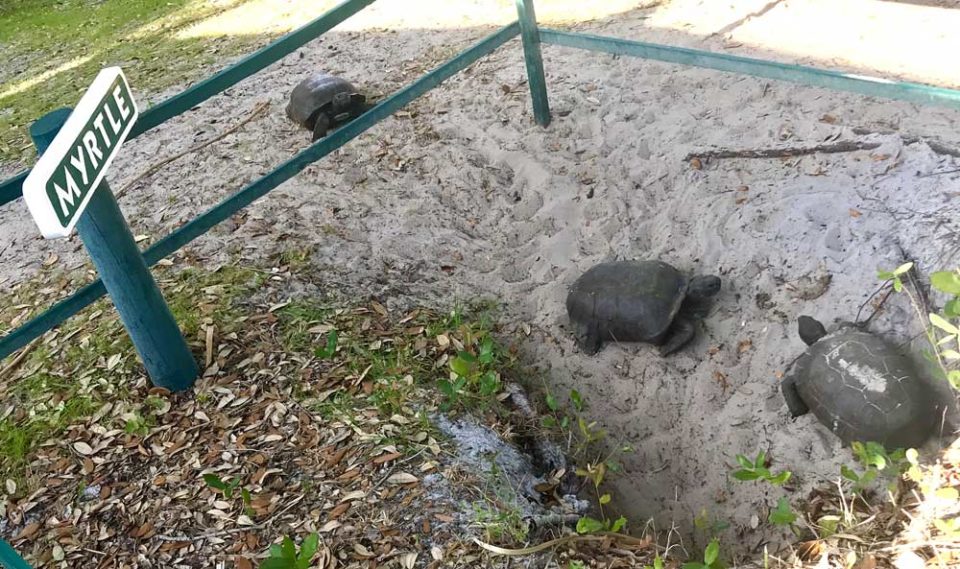
Gopher tortoises are beloved residents of Cabbage Key and reside in the hillside in front of the inn and restaurant. (Photo by Bonnie Gross)
Things to do when visiting Cabbage Key
It’s a small island and it’s mostly mangroves, so activities are limited. There is no pool or beach on Cabbage Key. (Robert Wells, a member of the family that owns the island said he has always considered Cayo Costa their “neighborhood beach.”)
A nature trail of about three-quarters of a mile winds through the woods and over another large shell mound. Excellent signage explains flora and fauna.

Money falls from the walls and ceiling at the Cabbage Key Inn. It goes to charity. (Photo by Bonnie Gross)
The large grassy front yard of the inn has a corn-hole game and some lawn chairs.
I was delighted by the presence of resident gopher tortoises, obviously revered here.
Each tortoise tunnel is protected by a low fence with a sign naming its inhabitant. The tortoises roam the grounds and are easy to spot.
Robert Wells, who moved to the island with his family when he was 3 years old, said they believe the tortoises thrive because the shell midden is high enough to give them expansive room for their tunnels without hitting the water table.
Some of these tortoises have lived there for decades, he said, with one recognizable tortoise present since the Wells bought the property in 1976.
The tortoises obviously know a good thing when they’ve found it.
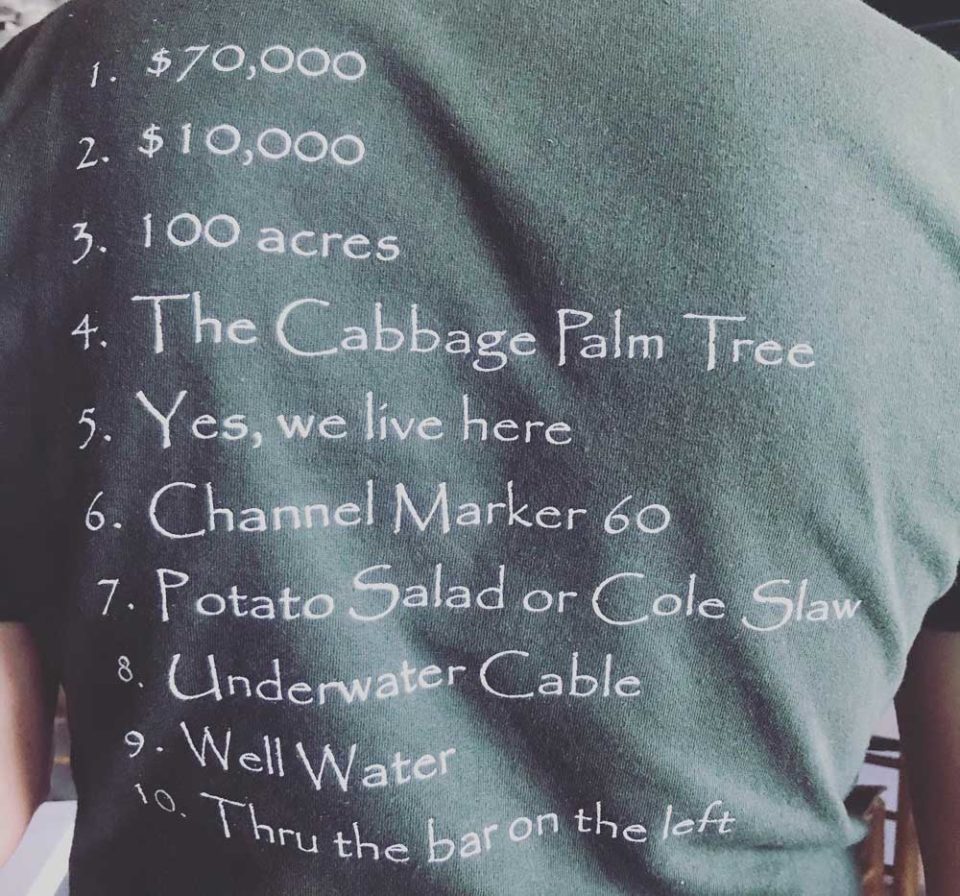
At lunch at Cabbage Key Inn, servers where T-shirts with the answers to the most commonly asked questions on back. (Photo by Bonnie Gross)
Tips on visiting Cabbage Key
Cabbage Key is about 20 miles northwest of Fort Myers, 5 miles south of Boca Grande, 8 miles north of Sanibel and Captiva islands. It is directly across from marker 60 on the Intracoastal Waterway.
The closest boats leave from Pineland Marina on the northern end of Pine Island, about a 40 minute drive from Fort Myers. To each Pineland, you’ll drive through Cape Coral and Matlacha.
Cabbage Key Inn and Restaurant website. Cabbage Key Inn and Restaurant are open year round. Some staff lives on the island; others arrive daily on the staff boat. There is an extensive and fascinating history of the island on the website and also in binders in the rooms.
The Island Girl Water Taxi serves Cabbage Key with several trips a day and is equipped to bring your kayak ($25) and luggage. You must reserve a spot. The scenic route from Pineland Marina includes stops at North Captiva Island, where there is a vacation community also reachable only by boat.
You are welcome to bring a cooler with beverages and snacks. For our kayak outing, we came with a picnic for the next day. You can buy sandwiches to go at the restaurant, but they are on the expensive side.
If you’re renting a kayak or skiff, you are asked to make the payment in cash.
Bring a book. The island is small and the happiest visitors are those who slow down and soak up the ambiance.
This article by Bonnie Gross originally appeared on floridarambler.com

